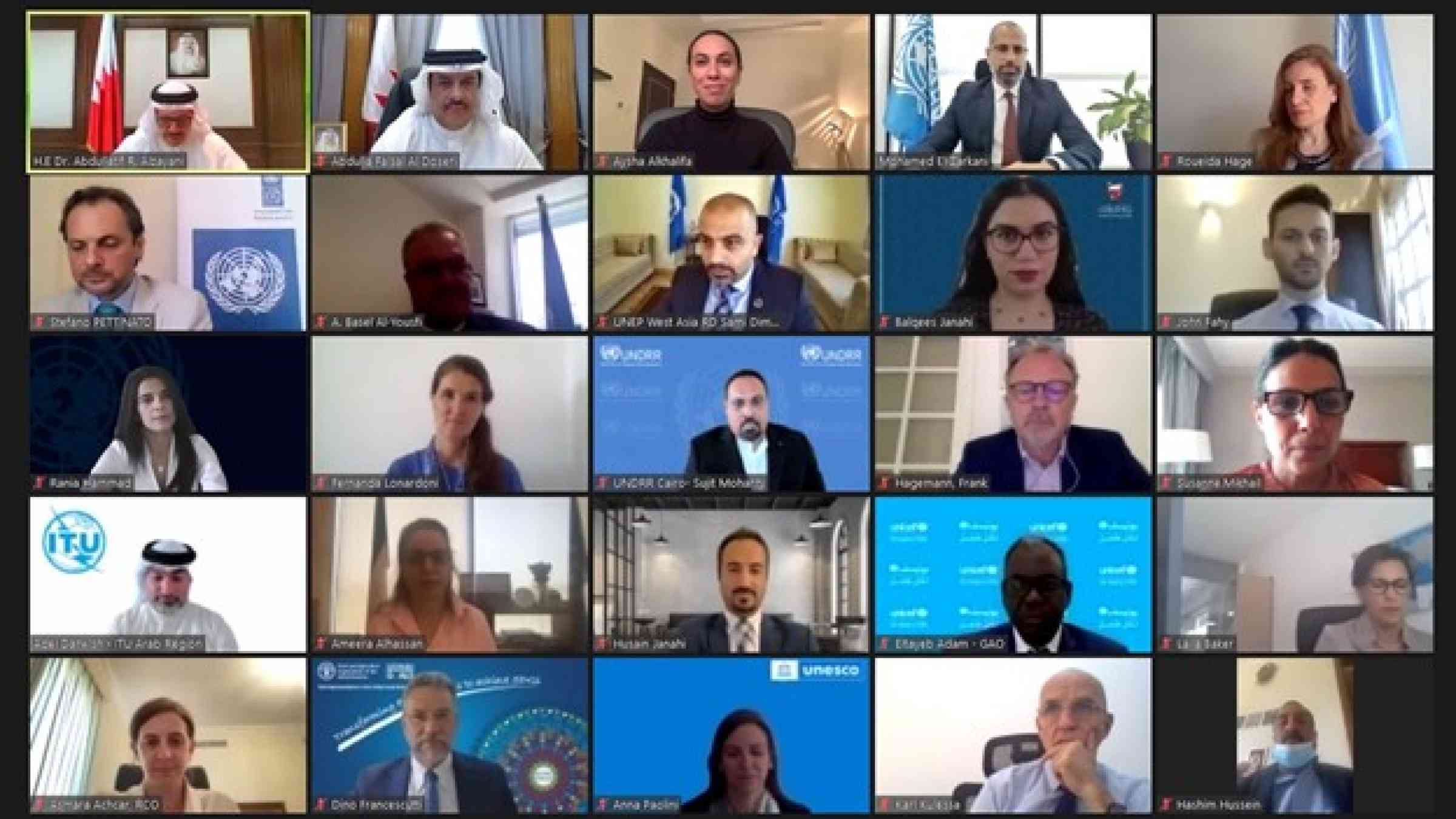The United Nations and the Government of Bahrain Sign the Strategic Cooperation and Sustainable Development Framework (2021-2022)

The United Nations and the Government of Bahrain continued their joint effort and cooperation and signed the Strategic Cooperation and Sustainable Development Framework of 2021-2022. The Foreign Minister of Bahrain Dr. Abdullatif bin Rashid Alzayani and the United Nations Resident Coordinator a.i. in Bahrain Mohamed Zarkani, in the presence of Assistant Foreign Minister Abdullah bin Faisal bin Jabr Al-Doseri, signed the agreement on May 31, 2021, in a virtual event attended by representatives of UN Resident and Regional Agencies. The agreement is considered the first UN Country Strategic Framework signed in the GCC, stemming from the effective and fruitful joint work of Bahrain with the United Nations.
On this occasion, Dr. Abdullatif bin Rashid Alzayani highlighted that the Strategic Cooperation and Sustainable Development Framework is a continuation of the previous cooperation between the Kingdom of Bahrain and the United Nations in various fields and at all levels, and reflects the common interest and desire in cooperating in a way that supports the implementation of the Government Action Plan 2019-2022 and the Economic Vision 2030, in alignment with the implementation of the Sustainable Development Goals (SDGs), especially in light of the current circumstances and the efforts of the Kingdom of Bahrain in confronting the Coronavirus pandemic.
For his part, Abdullah bin Faisal bin Jabr Al-Doseri commended the efforts of the United Nations to sign the Framework, describing this initiative as an example of constructive cooperation between the United Nations and the Kingdom of Bahrain, and welcomed the joining of new agencies to the updated version of the Framework, which in turn will enhance support and cooperation in future projects, stressing the keenness of the Kingdom of Bahrain to work jointly with various United Nations agencies.
In his turn, Mohamed Zarkani thanked the Government of Bahrain and Bahrain’s leadership for acknowledging the United Nations efforts to further the delivery of its national development priorities and achievement of the Sustainable Development Goals. He highlighted the tireless work of the Government of Bahrain and UN agencies to reach the updated version of the Framework, stressing that the Framework is fully aligned with the development strategies and policies of the Kingdom of Bahrain and provides a platform for greater coordination to implement projects supported by the United Nations agencies.
Laila Baker, Regional Director for Arab Countries in the Office of the Resident Coordinator of United Nations, expressed her optimism about what the signing of this Framework would achieve, especially in light of what the whole world is going through in the face of the coronavirus pandemic, which in turn led to delay in the implementation of SDGs. She added that such an event, the first of its kind in the Arab region, raises hope in the possibility of a multilateral partnership to develop the necessary plans to build a better tomorrow for the peoples of the region and the world.
Sujit Mohanty, Chief of the United Nations Office for Disaster Risk Reduction, Regional Office for Arab States, commented on the event, acknowledging the importance of such cooperation and highlighting the role of UNDRR ROAS in supporting the development of the Framework and the inclusion of Disaster Risk Reduction in its joint work plan including strengthening the implementation of the Strategy for Disaster Risk Reduction in coherence with the National Development and climate change priorities, strengthening capacities on disaster-related data and statistics, developing monitoring capacity for Disaster risk reduction through the Sendai Framework Monitoring, promoting for Disaster Risk Reduction and climate change adaptation through UNDRR awareness campaigns including the International Day for Disaster Risk Reduction, strengthening the national coordination mechanism to ensure coherence with climate change adaptation, and improving local capacity for resilience city planning through the Making Cities Resilient 2030 Programme.
The signing of this Framework comes as a culmination of previous efforts represented in the strategic partnership between the Kingdom of Bahrain and the United Nations 2018-2022, which was the first of its kind in the region, to exchange experiences and benefit from the expertise of the UN agencies in supporting projects in the Kingdom. In its new version, the Framework saw the joining of 21 UN Resident and Regional Agencies.
The Kingdom of Bahrain joined the United Nations as a Member State in 1971. The enduring partnership between the UN and the Kingdom of Bahrain is captured in the Strategic Partnership Framework (2018-2022). The Strategic Partnership Framework represents a coherent and comprehensive partnership strategy and is guided by Bahrain’s Economic Vision 2030 and UN’s 2030 Agenda. Following its Voluntary National Review in 2018, the Government Action Plan (2019-2022) placed the Sustainable Development Goals at the center of Bahrain’s national development agenda. Noting that the UN provides policy, advisory, and programmatic support to Bahrain in a wide range of sectors.